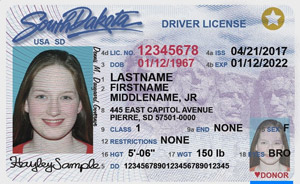- Updated for March 2025
- Based on official South Dakota Driver's manual
Free DMV Written Test Simulator for South Dakota | Updated for 2025
Savoring the sights from Needles Highway, the Peter Norbeck Scenic Byway, and the Spearfish Canyon Scenic Byway. The exciting nightlife and social scenes in Sioux Falls and Rapid City. Commuting to work in agriculture, healthcare, or manufacturing via the comfort and convenience of your vehicle. If you want to see more of “Great Faces and Great Places,” there’s no better way to do it than by driving yourself. But to do that legally, you must obtain and hold a driver’s license.
To obtain a license, you must meet a series of requirements. One of the most crucial is to pass the official South Dakota DMV written knowledge test, which covers South Dakota’s rules of the road and safe driving practices. All aspiring drivers, regardless of their age, are required to pass this test. If you’re under 18 or need to practice driving under supervision, passing the knowledge test is also a key requirement for obtaining an instruction permit. This credential will allow you to practice supervised driving as you prepare to pass the driving (road) test for a license.
The knowledge test consists of 25 questions and has a passing score of 80%. The test is based on the official driver’s manual (South Dakota DMV Handbook (SD Driver's Manual) 2025). The DMV urges you to study this manual. Nevertheless, a whopping 70% of applicants reportedly failed the South Dakota knowledge test on their first try.
We have created a test preparation program with a set of tools to help you pass the knowledge test. This is the second of our five South Dakota Permit Practice Tests. We designed it to help aspiring drivers like you pass the DMV knowledge test on their first try. Like the official knowledge test, this practice test is based on the official South Dakota driver’s manual, and it’s up to date as of March 2025. All practice questions are multiple choice. You must choose the best or most complete answer for each question.
Our AI Assistant can help you with any practice question. It can rephrase the question, supply a hint, or answer your own questions about driving. If you still miss the question, the AI Assistant will immediately tell you and explain the correct answer.
Finally, we also offer our own South Dakota Permit Test Study Guide to help you prepare for the day of the South Dakota written test. It covers how to prepare yourself physically and mentally for the test, what documents to take to the DMV, and what fees you may have to pay, among other topics.
- Perfect for learner’s permit, driver’s license, and Senior Refresher Test
- Triple-checked for accuracy
What you need to know

What to expect on the actual SD DMV exam
questions
correct answers to pass
passing score
minimum age to apply
List of questions (classic view)
- As you approach a roundabout, you must enter to the _______ of the central island.
- A driver must yield the right-of-way to other vehicles in all of the following situations EXCEPT
- When two vehicles approach an uncontrolled intersection (i.e., one without signs or signals) from different roadways at about the same time, the vehicle _________ has the right-of-way.
- If it starts to rain on a hot day, use caution because the pavement may be slippery for the first few minutes. This is due to
- If you are making a left turn, start the turn
- Work zone signs are usually
- What does this sign mean?
- The danger areas around trucks and buses where crashes are more likely to occur are called
- Which of the following is not a safe situation for passing?
- If traffic from another roadway is merging onto the roadway you are traveling on, you must
- A barrier of grass, concrete, or other material separating opposing lanes of traffic on a divided roadway is known as
- Which of the following statements about pavement markings is FALSE?
- If fog closes in completely while you are driving and visibility is reduced to near zero, what should you do?
- Which of the following statements about roundabouts is FALSE?
- Which of the following statements about school zones is FALSE?
- A red light with a green arrow means
- When approaching or driving through a work zone, you should NOT
- When there is not enough room for a U-turn, you may make
- When backing up, it is recommended to grasp the steering wheel at the ___ o'clock position and place your right arm on the back of the passenger seat.
- Before passing another vehicle, you should
- If you are parallel parked on the right side of the street, you should _________ before pulling out into traffic.
- This driver is using an arm signal to indicate that he or she intends to
- What does this flashing yellow signal at an intersection indicate?
- When you are turning from a one-way street onto a two-way street or divided roadway, you should turn from
- If you are changing lanes, preparing to pass another vehicle, or entering traffic, signal and check for passing traffic. First, use your mirrors. Next,
- If your vehicle's wheels drift onto the shoulder of the road, you must
- If you see a yield sign in your lane, you must
- You may drive in the leftmost lane of a multilane roadway when you are
- Which of the following rules about turning is FALSE?
- A steady yellow traffic light at an intersection indicates that you must
- The letters "RR" painted on the pavement indicate that you are approaching
- _________ may be used in work zones in both day and night to guide drivers into certain traffic lanes.
- Opposing lanes of traffic are separated by
- A sign with black letters on an orange background is
- While you are driving in a roundabout, an emergency vehicle with flashing lights approaches. What must you do?
- _________ are mobile devices that are used to give drivers advance warning of work zones or other unusual conditions.
- What does this sign indicate?
- On a highway with four or more lanes, slower traffic should always use
- Two solid yellow lines in the center of the road mean that
- If a railroad grade crossing has no warning devices or only a crossbuck sign, you should
More resources
- Alabama: Test 1 / Test 2
- Alaska: Test 1 / Test 2
- Arizona: Test 1 / Test 2
- Arkansas: Test 1 / Test 2
- California: Test 1 / Test 2
- Colorado: Test 1 / Test 2
- Connecticut: Test 1 / Test 2
- Delaware: Test 1 / Test 2
- District of Columbia: Test 1 / Test 2
- Florida: Test 1 / Test 2
- Georgia: Test 1 / Test 2
- Hawaii: Test 1 / Test 2
- Idaho: Test 1 / Test 2
- Illinois: Test 1 / Test 2
- Indiana: Test 1 / Test 2
- Iowa: Test 1 / Test 2
- Kansas: Test 1 / Test 2
- Kentucky: Test 1 / Test 2
- Louisiana: Test 1 / Test 2
- Maine: Test 1 / Test 2
- Maryland: Test 1 / Test 2
- Massachusetts: Test 1 / Test 2
- Michigan: Test 1 / Test 2
- Minnesota: Test 1 / Test 2
- Mississippi: Test 1 / Test 2
- Missouri: Test 1 / Test 2
- Montana: Test 1 / Test 2
- Nebraska: Test 1 / Test 2
- Nevada: Test 1 / Test 2
- New Hampshire: Test 1 / Test 2
- New Jersey: Test 1 / Test 2
- New Mexico: Test 1 / Test 2
- New York: Test 1 / Test 2
- North Carolina: Test 1 / Test 2
- North Dakota: Test 1 / Test 2
- Ohio: Test 1 / Test 2
- Oklahoma: Test 1 / Test 2
- Oregon: Test 1 / Test 2
- Pennsylvania: Test 1 / Test 2
- Rhode Island: Test 1 / Test 2
- South Carolina: Test 1 / Test 2
- South Dakota: Test 1 / Test 2
- Tennessee: Test 1 / Test 2
- Texas: Test 1 / Test 2
- Utah: Test 1 / Test 2
- Vermont: Test 1 / Test 2
- Virginia: Test 1 / Test 2
- Washington: Test 1 / Test 2
- West Virginia: Test 1 / Test 2
- Wisconsin: Test 1 / Test 2
- Wyoming: Test 1 / Test 2
Your go-to, trusted source
Experience the Driving-Tests differenceOur commitment to accuracy and quality in our practice tests
Explore our rigorous, multi-tiered verification process that ensures each question mirrors the official manual for unparalleled accuracy.

At Driving-Tests.org, we understand the importance of reliable and accurate practice tests to help you prepare for your DMV exam. That's why we've developed a meticulous process to create and continually update our practice questions, ensuring they reflect the most current driving laws and regulations.
Here's an inside look at how we maintain the highest quality in our practice tests.
Content Creation and Verification Process
- Alignment with Official Manuals:
Every question we develop is based on the most recent version of each state's official driving manual. Our team regularly monitors each state DMV's website for the latest updates to ensure our practice tests are always aligned with the most current information. - Community Feedback Integration:
We leverage feedback from our vast community of users to understand which topics are most frequently tested. This helps us focus on the areas that are most relevant and beneficial for your preparation. - Expert Content Creation:
Our in-house editor, Steven, who has extensive experience in driver education, crafts each question with precision. He conducts a thorough review of each question against the official manuals to ensure accuracy. - Rigorous Review Process:
Once Steven has finalized a set of questions, our team conducts a joint review session. This second level of scrutiny involves content accuracy, proofreading, and fact-checking to eliminate any errors. - User Feedback Mechanism:
After a question goes live on our site, we keep the lines of communication open. Each question features a feedback button, inviting users to report any issues or errors. This continuous feedback loop allows us to address and rectify any concerns promptly. - Responsive Updates:
In line with our commitment to accuracy, we quickly update our practice questions to reflect any changes in the DMV manuals. Additionally, we update the free electronic copy of the state's driver's license manuals on our site, typically within a few days after the DMV publishes them.
Our thorough quality control process ensures that you have access to practice tests that are as accurate and up-to-date as possible. We believe in the power of well-prepared drivers and are dedicated to providing you with the best study tools to help you succeed on your DMV exam.
Pass the First Time - Guaranteed
Before you view your test results, discover how you can pass faster with Premium:
Real Exam-Like South Dakota Questions
Get 650+ questions seen on the real test
Money-Back Guarantee
If you don't pass, it costs you nothing
97% Premium Users Pass on Their First Try
Compare with the average US passing rate of 49%
